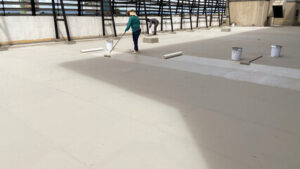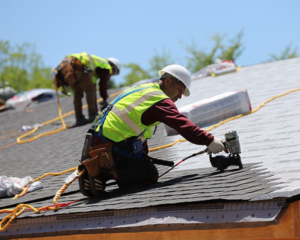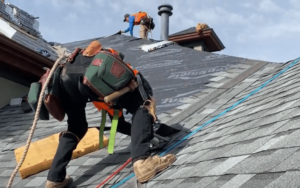Flat roof coatings are a cost-effective way to extend the lifespan of your roof. They seal leaks and repair minor damage, preventing the need for a costly roof replacement.

It’s easy to apply and does not require multiple coats or reinforcing tape. It’s a long-lasting and highly sustainable solution that can last for decades with only a recoating every 15-20 years. Visit wecoatus.com to learn more.
The reflective properties of flat roof coatings help lower energy costs by reducing the amount of heat absorbed on the building. This in turn reduces the energy needed to keep a building cool and comfortable. This can significantly reduce your energy bills, making roof coatings a great investment for any commercial property owner.
Another benefit of roof coating is that it can protect the roof materials from environmental elements. This can prevent leaks that result in damage to the ceiling and walls of a building. Additionally, it can also extend the life of the roof by preventing unwanted moisture from entering the roof structure.
Flat roof coatings are made of special polymers that are highly resilient against the elements. They are designed to withstand UV radiation, temperature fluctuations, chemicals, and other damaging elements. This means that they can protect the roof from damage that would otherwise require costly repairs or replacement. This makes them an excellent choice for commercial properties that require the highest level of protection.
Leaks are one of the most common problems with flat roofs. They can result from a variety of causes, such as storms, wind and rain, ponding water, or other factors. These leaks can damage the ceiling and walls of a building, causing mold growth, structural damage, or other issues. However, roof coatings can help prevent leaks by preventing moisture from penetrating the roofing materials.
Getting your flat roof recoated every few years can also help to keep it in good condition and reduce the risk of leaks. It can also help to improve the aesthetic of your home, making it look more beautiful and modern.
The cost of roof coating will vary depending on the size and pitch of your flat roof, the type of material used, and the amount of prep work that is required. However, it is important to remember that a properly applied roof coating can protect your flat roof from leaks and extend its lifespan, saving you money on expensive repairs in the long run.
It is important to note that roof coatings must be applied by a licensed and experienced contractor to ensure that they are installed correctly. A poorly applied roof coating can lead to blistering, delamination, insufficient energy efficiency, and other issues.
Increased Roof Lifespan
Flat roofs are particularly prone to damage from the elements and need to be regularly maintained to ensure longevity. While a flat roof replacement can be costly, roof coating is a less expensive and more sustainable solution that will significantly extend the lifespan of your roofing system. In addition, flat roof coatings are a great alternative to traditional roof sealants for preventing leaks.
Typically, flat roof coatings are designed to be compatible with the existing roofing substrate and the local climate. This allows the coating to expand and contract with your roof as the weather changes, providing a durable layer of protection. Some flat roof coatings also offer reflective properties that help keep your building cooler and reduce energy costs.
Roof coatings typically last longer than traditional flat roof materials, but their lifespans vary depending on the type of coating and the environment. Generally, acrylic and silicone coatings can last for up to 10 years, while elastomeric coatings can last up to 25 years.
Regular roof maintenance will improve the lifespan of your flat roof coating and will also help you catch small issues before they become bigger problems. A professional roofing contractor can assist you with a maintenance plan that will keep your roof looking and performing its best for as long as possible.
The longevity of a roof coating will depend on the materials used, the environment, and the frequency of roof repairs. It is essential to work with a qualified roofer who can recommend the best coating for your flat roof and provide expert installation and repair services.
In addition to stopping leaks and reducing energy consumption, flat roof coatings will significantly prolong the lifespan of your flat roofing system. In fact, they cost half as much as a complete roof replacement, making them a viable and cost-effective solution for homeowners and commercial property owners.
In addition to the advantages of flat roof coatings listed above, the Sil-Flex roofing system can withstand ponding water for an indefinite period of time. This feature is particularly important for areas prone to heavy rainfall and extreme temperatures that can cause premature degradation of traditional roofing materials.
Reduced Maintenance Costs
Flat roofs are a cost-effective and functional option for many commercial buildings, offering more usable space for a variety of purposes. However, due to their low pitch, flat roofs can be prone to leakages and other problems that increase maintenance costs. A quality flat roof coating protects the roofing materials and reduces the risk of future problems.
A roof coating can be applied over virtually any flat roof surface and is an excellent choice for older, damaged or worn out membranes. The coating will extend the lifespan of the roof and provide increased durability and resistance to water, wind, and sun.
Roof coatings also offer improved energy efficiency and environmental sustainability. They reflect the sun’s rays, keeping the building cool and helping to lower energy bills. Additionally, they can prevent thermal shock and help mitigate leaks caused by the random expansions and contractions of the building’s structure.
Leaks can be expensive to repair, and even more costly in terms of the damage they cause to the building’s interior and structural integrity. A quality flat roof coating can help to prevent leaks and water damage by preventing moisture from leaking into the roof.
A roof coating will also help to keep the building clean, reducing maintenance costs and improving its appearance. Flat roof coatings are typically made of materials that repel dirt, moss, algae and other debris. They are also easy to clean, and can be easily rinsed off with a hose or pressure washer to remove any buildup.
Adding a roof coating to your flat roof can greatly increase its life expectancy and help to reduce future maintenance costs. It is important to find a contractor with experience in roof coating, and can advise you on the best product for your specific needs. They should be able to inspect the flat roof, assess its condition, and recommend the best solution to suit your budget and requirements. They should also be able to explain the benefits of flat roof coatings and any additional options that may be available for you. In addition, they should be able to offer a system warranty that covers both the work of the roofing contractor and the flat roof coating.
Reduced Carbon Footprint
Flat roof coatings use a low-VOC, water-based formulation that is much more environmentally friendly than traditional roofing products such as black tar or asphalt. This makes the flat roof coating a better choice for commercial buildings and industrial properties located in areas regulated by strict environmental standards.
A roof coating is also designed to withstand the elements, protecting your building from the elements and keeping moisture out of the roof structure. This protects the roof from damage and extends the lifespan of your roof. A roof coating can increase your flat roof’s life expectancy from 10 years to 20 or even 25.
In addition to its protective capacity, a roof coating will reduce energy costs by reflecting the sun’s rays, which in turn lowers cooling bills. This means a savings for you and your building tenants!
A flat roof coating can also withstand the impact of falling debris and other forces that would otherwise damage your flat roof. This is because a roof coating is flexible and able to stretch and conform to the deforming force, returning to its original shape when the pressure is removed. This will help to prevent costly repairs and replacements of your flat roof.
As a result, flat roof coating is often considered to be a more sustainable roofing option than a complete roof replacement. With a regular once-a-year routine inspection/maintenance to remove any accumulated debris and make sure that the roof drains are clear, a silicone coating system should last 15-20 years, with minimal additional maintenance required.
The Ure-A-Sil System is an industry leading fluid-applied flat roof restoration system that combines the strength, flexibility and adhesion of urethane with the unsurpassed UV stability, reflectivity, and waterproofing performance of silicone roof coatings. This powerful combination makes the Ure-A-Sil System the ideal solution to safeguard commercial and industrial flat roofs from ponding water, UV degradation, and other extreme environmental conditions. In addition, the Ure-A-Sil System is eligible for long-term NDL System Warranties that cover both the workmanship and material of the roof restoration project, providing peace of mind for building owners.

